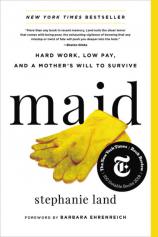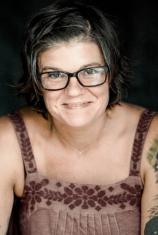Excerpt
Excerpt
Maid: Hard Work, Low Pay, and a Mother's Will to Survive

The Chef’s House
When we lived in the homeless shelter, I sat up late at night, long after Mia went to bed. As the night stretched out before me, I created a vision of a “happy” life. There would be a large yard of freshly cut green grass and a tree with a swing hanging from a branch. Our house wouldn’t be terribly big, but it’d be large enough that Mia could run around in it, maybe with a dog, and build forts beneath the rungs of furniture. Mia would not only have her own bedroom but her own bathroom, too. Maybe there’d be a proper guest room, or an office where I could write. A real couch and a matching love seat. A garage. If we only had these things, I thought, we would be happy.
Most of my clients had these things—the things I yearned for in those dark nights sitting up alone—and they did not seem to enjoy life any more than I did. Most worked long hours, away from the homes they fought so hard to pay for, with even farther commutes than mine. I began to pay attention to the items that cluttered their kitchen counters: the receipts for rugs that were as expensive as my car, the bill for the dry cleaner that could replace half my wardrobe. In contrast, I divided my hourly wages into fifteen-minute increments to add up how much of my physical work paid for my gas. Most days I spent at least an hour just making the money it took in gas to get to work in the first place. But my clients worked long hours to pay for lavish cars, boats, sofas that they kept covered with a sheet.
They worked to pay Classic Clean, who paid me just above minimum wage, to keep it all spotless, in place, acceptable. While they paid for my work like some magical cleaning fairy, I was anything but that, shuffling through their house like a ghost. My face had an ashen hue from a lack of sun, dark circles under my eyes from a lack of sleep. Usually my hair was unwashed, pulled back into a ponytail or under a kerchief or hat. I wore pairs of Carhartt cargo pants until the holes in the knees were unsightly enough that my boss told me to replace them. My job afforded me little money to spend on clothes, even for work. I worked through illnesses and brought my daughter to day care when she should have been at home. My job offered no sick pay, no vacation days, no foreseeable increase in wage, yet through it all, still I begged to work more. Wages lost from missed work hours could rarely be made up, and if I missed too many, I risked being fired. My car’s reliability was vital, since a broken hose, a faulty thermostat, or even a flat tire could throw us off, knock us backward, send us teetering, falling back, toward homelessness. We lived, we survived, in careful imbalance. This was my unwitnessed existence, as I polished another’s to make theirs appear perfect.
The Chef’s House had two wings: the guest bedroom and office on one end and the master bathroom with a hallway that led to a converted garage, where their dogs, two white Westminster terriers, always left puddles of pee. They went with either Mr. Lund or his wife to work on the days I cleaned. I hadn’t noticed one had also started pooping by the dining room table, and I’d accidentally walked through it. I groaned. Beige carpet. Light beige. Almost fucking white. There was no way I’d be able to rub out shit stains. I’d still only met the owner of the Chef’s House one time in the six months I’d cleaned there for three hours every other Thursday. The Chef’s House had been one of Pam’s original clients. She used to clean it weekly in two hours, an ability I balked at because the house was huge. I would sweat hard, working that house, too busy to stop to text or take a call from anyone for fear I wouldn’t complete the clean on time. I certainly couldn’t pause to scrub out brown smudges of shit.
…
A third of the time I spent at the Chef’s House went to floors. Sometimes I shuffled to my car a little bent over with one hand on the bottom muscles near my spine. I wasn’t a stranger to pain, but being hunched over for hours cleaning took its toll. My spine curved like a question mark; it had put me in the emergency room several times. I had to be careful not to upset it, and I popped 800-milligram doses of ibuprofen around the clock if I did. My latest mistake at work had been bending slightly to pick up the edge of a couch to push it closer to a wall. It felt as heavy as my car. The muscles in my back, prepared to lift something light, snapped back like a released rubber band and stuck. For days, I gritted my teeth through spasms, losing sleep from the pain. I couldn’t handle painkiller pills very well. They made me loopy and sick, like I was half drunk.
When I saw the counters of the Chef’s House starting to fill with large prescription pill bottles of hydrocodone, it was almost tempting to pocket a few. Prescription pills littered the bathroom countertops and the medicine cabinets of most of the houses I cleaned, but this one had giant bottles in almost every room, going from full to empty in the two weeks between my visits.
Lonnie and I never spoke of the secrets the empty houses revealed. Most of my clients had sleep aids, ones for depression and anxiety, or pain. Perhaps because my clients had easier access to doctors or health insurance plans with a generous prescription medication clause built in; perhaps access to medical care created a default to prescriptions as a solution. Though I could get coverage for Mia, I made too much money for me to receive Medicaid, so I couldn’t see a doctor about chronic back pain or lingering sinus infections and coughs. Mia, thankfully, had always been covered, so I never had to worry about that, and the application process was simple, since they used the same paperwork I submitted for food stamps. It would have been impossible to afford her regular check-ups and vaccinations, let alone the surgery she’d just had, but I always wondered if doctors and nurses, after seeing the type of insurance I used, treated us differently because she had Medicaid. Even though I would have greatly benefitted from regular care, physical therapy, or even access to a gynecologist, I’d never be able to afford that for myself. I had to be careful not to hurt myself, not to get sick, and try to manage my pain on my own. But vitamins, over-the-counter cold and flu remedies, and even Tylenol or ibuprofen were a huge expense, or so low on the budget that I rationed what I had. Living with illness or pain was part of my daily life. Part of the exhaustion. But why did my clients have these problems? It seemed like access to healthy foods, gym memberships, doctors, and all of that would keep a person fit and well. Maybe the stress of keeping up a two-story house, a bad marriage, and maintaining the illusion of grandeur overwhelmed their systems in similar ways to how poverty did mine.
Maid: Hard Work, Low Pay, and a Mother's Will to Survive
- Genres: Memoir, Nonfiction, Social Sciences
- paperback: 288 pages
- Publisher: Hachette Books
- ISBN-10: 0316505099
- ISBN-13: 9780316505093







